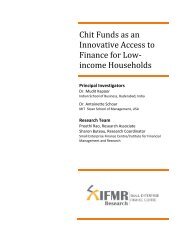Government of India Volume I: Analysis and Recommendations
Government of India Volume I: Analysis and Recommendations
Government of India Volume I: Analysis and Recommendations
You also want an ePaper? Increase the reach of your titles
YUMPU automatically turns print PDFs into web optimized ePapers that Google loves.
FOUNDATIONS OF CONTRACTS AND PROPERTY<br />
Table <strong>of</strong> <strong>Recommendations</strong> 13.3 Exemption for derivative contracts<br />
1. Notwithst<strong>and</strong>ing section 30 <strong>of</strong> the Contract Act, 1872, a derivative contract is enforceable if it is exchange<br />
traded or entered into between sophisticated counterparties;<br />
2. If a financial service firm is able to prove that it transferred any security, deposit or obligation to a legally<br />
recognised nominee or to an executor or liquidator, it should be immune from being made a party to any<br />
dispute about the inheritance or bankruptcy <strong>of</strong> a person.<br />
disputes over securities should not involve the depository where a deceased person had<br />
kept securities. Similar issues are found in bank accounts <strong>and</strong> insurance contracts. This<br />
requires the laws to create a clear ‘safe-harbour’ for financial service firms as long as they<br />
transfer the securities to a nominee, or a court appointed executor, liquidator. The Commission<br />
states that this does not change any substantive provision in the inheritance laws<br />
<strong>of</strong> any person but merely clarifies the duties <strong>of</strong> financial firms in specified event.<br />
The detailed recommendations <strong>of</strong> the Commission on securities are summarised in<br />
Table 13.3.<br />
13.3. Infrastructure Institutions<br />
There are certain activities associated with organised financial trading which are unique<br />
<strong>and</strong> different from the usual activities rendered by any other financial service provider in<br />
the financial market.<br />
13.3.1. Different types <strong>of</strong> Infrastructure Institutions<br />
Infrastructure Institutions are a product <strong>of</strong> the historical development <strong>of</strong> the financial sector<br />
markets. As use <strong>of</strong> technology <strong>and</strong> complexity <strong>of</strong> the financial sector increases new<br />
types <strong>of</strong> Infrastructure Institutions will develop within the financial sector. The Commission<br />
reviewed the requirement for designation as Infrastructure Institutions <strong>and</strong> listed the<br />
following activities in the financial sector at present:<br />
1. Multilateral Payment Clearing System: Which is a mechanism to transfer value between<br />
a payer <strong>and</strong> a beneficiary by which the payer discharges the payment obligations<br />
to the beneficiary. Payments enable two-way flows <strong>of</strong> payments in exchange<br />
for goods <strong>and</strong> services in the economy;<br />
2. Exchanges: Exchanges are organisations which allow a number <strong>of</strong> parties to trade<br />
securities amongst themselves. They create rules for trading, monitor parties to<br />
prevent abuse, ensure declaration <strong>of</strong> relevant information, keep record <strong>of</strong> transactions<br />
<strong>and</strong> manage risks arising out <strong>of</strong> the transactions;<br />
3. Clearing <strong>and</strong> settlement: Clearing is the calculation <strong>of</strong> the obligations <strong>of</strong> counterparties<br />
to make deliveries or make payments on the settlement date. The final<br />
transfer <strong>of</strong> securities (delivery) in exchange for the final transfer <strong>of</strong> funds (payment)<br />
in order to settle the obligations is referred to as settlement. Once delivery <strong>and</strong><br />
payment are completed, the settlement is complete;<br />
4. Title storage: Securities be kept in physical or de-materialised form. Securities accounts<br />
are maintained to reduce the costs <strong>and</strong> risks associated with the safekeeping<br />
<strong>and</strong> transfer <strong>of</strong> securities;<br />
5. Counter party default management: The risk that the counter party to a financial<br />
transaction may default on its promise <strong>and</strong> thereby jeopardise the entire transaction<br />
is minimised by imposing a Central Counter Party (CCP). This CCP acts as a<br />
buyer to the seller <strong>and</strong> a seller to the buyer only for the purpose <strong>of</strong> settlement;<br />
122 FINANCIAL SECTOR LEGISLATIVE REFORMS COMMISSION



